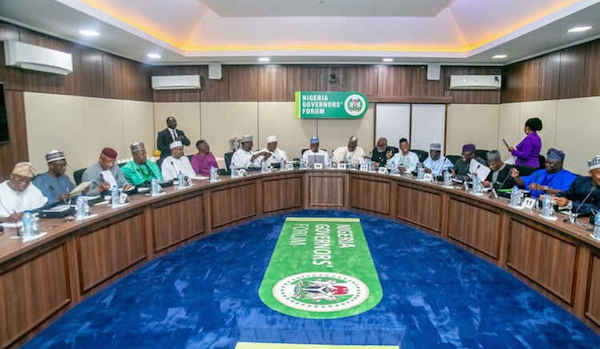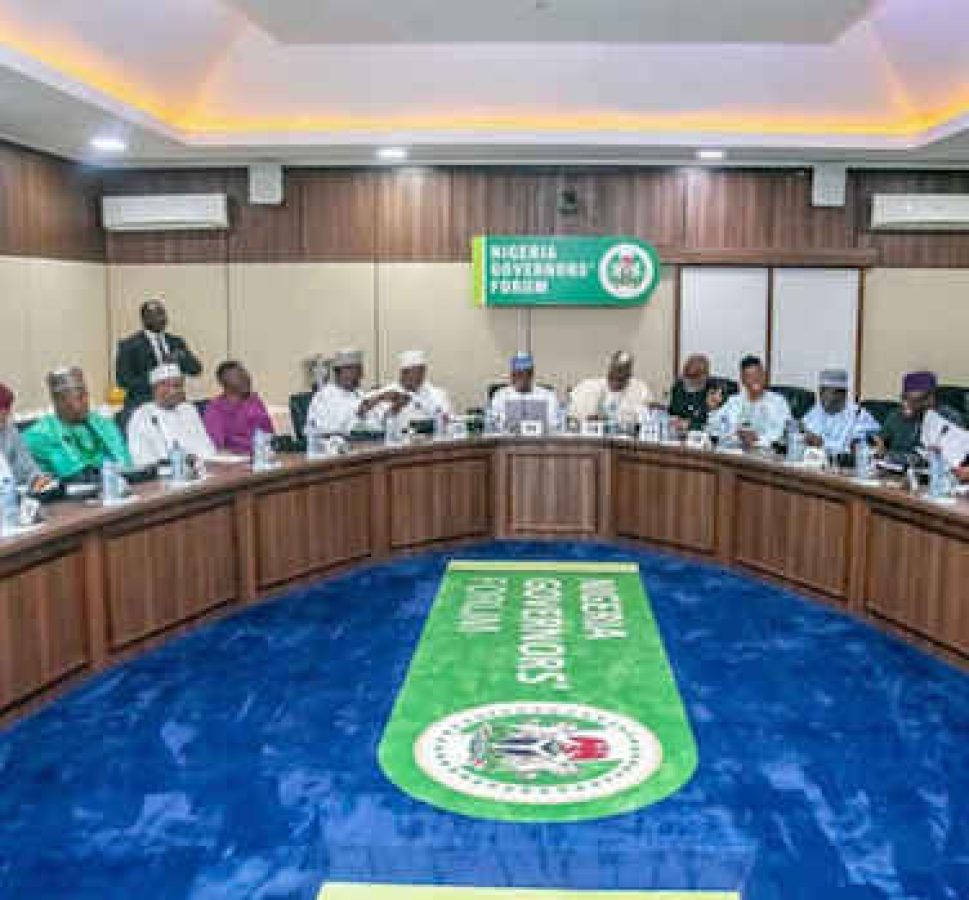
ABUJA- THE 36 State governors under the aegis of the Nigeria Governors Forum, NGF, have disclosed that they are reviewing their individual fiscal space as state governments and the consequential impact of various recommendations, geared towards arriving at what they described as an improved minimum wage they can pay sustainably.
This came as the Nigeria Labour Congress, NLC, gave reasons organised labour is fronting N615,000 as the new national minimum wage, saying it is being magnanimous by not raising its demands despite compelling reasons to do so.
The governors said that they celebrate with workers across the country for their dedication to service and patience, as all have worked with the Federal Government, labour, organised private sector and relevant stakeholders in arriving at an implementable national minimum wage
According to the governors, while they acknowledge various initiatives adopted recently by way of wage awards and partial wage adjustments, it is imperative to state that the 37-member tripartite committee inaugurated on the National Minimum Wage is still in consultations and yet to conclude its work.
The governors added that they would remain committed to the process and promised that better wages would be the invariable outcome of their ongoing negotiations.
In a statement, yesterday by NGF Chairman and Governor of Kwara State, AbdulRahman AbdulRazaq at the end of the virtual meeting held Wednesday night, the state governors said they are committed to looking into issues bordering on remuneration of state judicial officers and the infrastructure of the courts.
‘NGF working on implementable minimum wage’
The statement read: “We, members of the NGF, at our meeting held today, deliberated on various issues of national importance.
“The forum celebrates with workers across the country for their dedication to service and patience, as we work with the Federal Government, labour, organised private sector and relevant stakeholders in arriving at an implementable national minimum wage.
“While we acknowledge various initiatives adopted recently by way of wage awards and partial wage adjustments, it is imperative to state that the 37-member tripartite committee inaugurated on the National Minimum Wage, is still in consultation and yet to conclude its work.
“As members of the committee, we are reviewing our individual fiscal space as state governments and the consequential impact of various recommendations, to arrive at an improved minimum wage we can pay sustainably. We remain committed to the process and promise that better wages will be the inevitable outcome of ongoing negotiations.
“Members received the outgoing Country Director, Mr. Shubham Chaudhuri, and the incoming Country Director, Mr. Ndiame Diop, of the World Bank, to discuss the bank’s vision for transitioning. Mr Chadhuri appreciated the forum for the strategic role it continues to play in coordinating collective action for developmental change.
“He applauded the non-partisan character of the forum, the professionalism of its Secretariat, and state governments’ commitment to mutual accountability mechanisms such as performance-based financing interventions by the bank.
“Members expressed confidence in the choice of Mr. Diop, to lead the collaboration going forward and look forward to a sustained and deepened relationship.
“The forum discussed the revised National Policy on Justice (2024 -2028) from the just concluded National Summit on Justice on April 24 and 25, 2024. Members agreed to consider the submissions from the summit as may concern their states, including recommended legal amendments, administrative improvements, and policies to strengthen the justice sector.
“Also, the forum committed to looking into issues bordering on the remuneration of state judicial officers and the infrastructure of the courts.
“The forum received a presentation from the National Human Capital Development, HCD, Programme, Core Working Group Secretariat, led by Ms. Rukaiya El-Rufai and Dr. Ahmad Abdulwahab. Both highlighted the marginal progress made by States and its contribution to Nigeria’s Human Development Index, HDI, especially across health, nutrition, education, and labour force participation.
“Having reviewed the previous programme design and national strategy, a revised governance and implementation roadmap was proposed to scale up impact and ensure sustainability. Members pledged to support the effective domestication of proposed revisions to the national HCD strategy.
“Members received a briefing from Mrs. Oyinda Adedokun, Programmes Manager, State Action on Business Enabling Reforms, SABER, Federal Ministry of Finance Program Coordination Unit. The briefing highlighted states’ performance in implementing advocated reforms relating to land administration, the regulatory framework for private investment in fibre optics infrastructure, services provided by investment promotion agencies and public-private partnership units, and efficiency and transparency of government-to-business services, under the World Bank-financed programme.
“The forum commiserated with the governors of Rivers State, Siminalayi Fubara and Ogun State, Prince Dapo Abiodun over the petrol tanker explosion and gas explosion that occurred on April 26 and 27, 2024, respectively.
“Members called for proper maintenance of trucks especially those fitted to convey Compressed Natural Gas, CNG, and recommended appropriate training for truck drivers. On enforcement of regulations, members resolved to engage relevant Ministries, Departments and Agencies, MDAs, in order to align the activities of federal regulators with the operations of officials at the sub-national level.”
Labour justifies N615, 000 wage demand
The NLC, has given reasons why Organised Labour is fronting N615, 000 as new national minimum wage, NNMW.
According to NLC, the breakdown of the N615,000 include Housing/Accommodation @N40,000 a month; Electricity/Power @ N20,000 a month; Utility/Water @N10,000; Kerosene/Gas @N35,000; Food @N9,000 a day multiplied by 30 days (month) N270,000; Medicals for a month @N50,000; Clothing for a month @N20,000; education for a month @N50,000; sanitation for a month@ N10,000; and transportation for a month @N110,000.
In the statement, yesterday, NLC President Joe Ajaero, said the N615,000 excludes expenses or expenditure on calls and data, offerings in churches and mosques, community dues, entertainment, savings and security etc.
According to him, the listed above are, therefore, just for the bare necessities.
The NLC in a statement entitled “2024 National Minimum Wage negotiation: How we arrived at N615,000,” also countered the government’s position that the upcoming new minimum wage would take effect from May 1.
It said the new minimum wage began on April 19, adding, “It has become imperative at this point that we inform Nigerians, who may not have known already the foundations upon which our initial demand for a N615,000 new National Minimum Wage is based.
“The figure is a product of a painstaking effort through which we captured the cost of living of Nigerian workers and masses in all parts of the country. It was essentially an outcome of independent research conducted by the NLC and Trade Union Congress, TUC, on the cost of meeting the primary needs of an average family around the country. Our research was based on a family with both parents alive and four children without the burden of having other dependents with them.
“A questionnaire was designed and sent to all the state councils of NLC and TUC from where these questionnaires were sent to our members in all the local government areas in the country to gather the monthly cost of living for the average family as described above.
“In the items and cost, we hope that this will enable Nigerians to understand what propels our demand so that better clarity is made to create better engagement around the ongoing National Minimum Wage Negotiation process.
“We deliberately removed certain elements from the basket used in calculations of this nature. However, it should also be noted that we have not included things like expenditure on calls and data, offerings in churches and mosques, community dues, entertainment, savings and security etc. These are, therefore, just for the bare necessities.
“It should be noted that we arrived at the figure of N615,000 before the increase in electricity tariff and the recent scarcity of petrol across the nation leading to the appearance of long queues with attendant increased transport fares. Any figure below the N615,000 amount becomes a starvation wage and condemns Nigerian workers and their families to perpetual poverty.
“We have to remember that the old minimum wage has expired on April 18, 2024, and a new one is expected to have come into effect on April 19, 2024. However, because of the government’s inability to comply with the law that demanded negotiations for a new national minimum wage to have begun six months before the expiration of the existing one, concluding the new one has become unfortunately delayed.
“We are sure that our social partners would see our demonstration of understanding, sacrifice and reasonableness in our demands and thus accept this figure without much delay. We also enjoin all well-meaning Nigerians to implore the government and employers to meet our demands for the sake of justice, equity and national development.”






